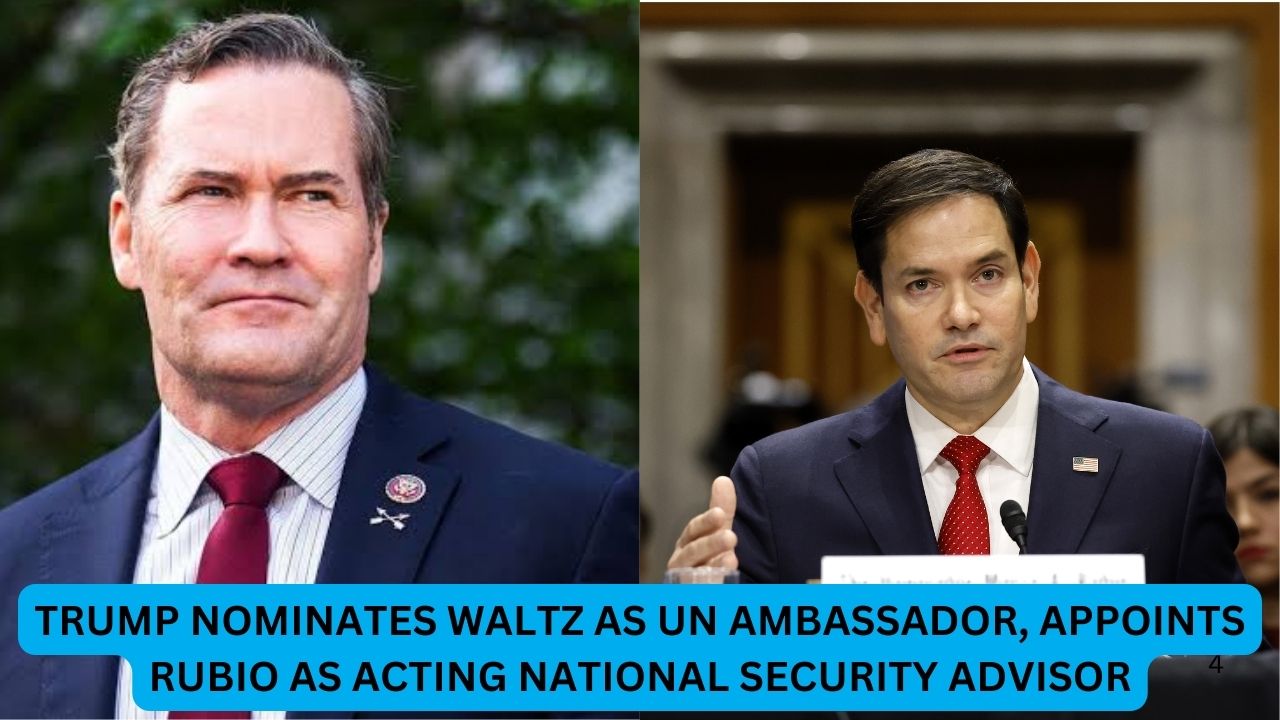In a bold shake-up of his national security leadership, former President Donald Trump has nominated Rep. Mike Waltz to become the next United States Ambassador to the United Nations, replacing the current envoy. Simultaneously, Trump has appointed Secretary of State Marco Rubio as the acting National Security Advisor (NSA), entrusting him with two of the nation’s most influential foreign policy roles.
The announcement, made on May 1, 2025, marks a significant moment in Trump’s evolving foreign policy strategy as he prepares for the next phase of his political career. The dual appointments underscore Trump’s preference for loyalty and alignment with his “America First” doctrine.
A Controversial Pivot: Why Waltz Was Moved
Mike Waltz, who had been serving as the National Security Advisor, was at the center of recent controversy. A report revealed that he had mistakenly added journalist Jeffrey Goldberg to a secure Signal group chat involving discussions of classified U.S. military operations targeting Houthi militants in Yemen. The security lapse triggered criticism from both lawmakers and former national security officials.
Despite the serious nature of the misstep, Trump opted not to dismiss Waltz. Instead, he reassigned him to the UN role, reportedly to avoid sparking further perceptions of instability within the administration.
“Waltz has served with dedication, and I believe he’ll be a strong voice for the U.S. at the United Nations,” Trump said during the announcement, downplaying the previous security error. Source: New York Post
Marco Rubio Steps Into Powerful Dual Role
Senator-turned-Secretary of State Marco Rubio has now been tapped to serve as acting NSA while retaining his top diplomatic post. This unusual consolidation of power is reminiscent of the 1970s, when Henry Kissinger held both roles under President Nixon.
Rubio’s reputation as a foreign policy hawk and his alignment with Trump on matters involving China, Latin America, and national sovereignty have made him a natural fit for the role. Sources close to the administration said Rubio is expected to hold the interim NSA position until a permanent replacement is selected.
According to AP News, Rubio’s dual role reflects Trump’s growing reliance on loyalists with a clear understanding of his foreign policy objectives, particularly ahead of what many expect to be a more aggressive international strategy in a potential second term.
Political Considerations Shaped the Choices
Initial speculation suggested that Rep. Elise Stefanik would be nominated as the UN Ambassador. However, that move was ultimately shelved due to concerns that vacating her congressional seat could jeopardize the GOP’s razor-thin majority in the House of Representatives. Waltz, whose Senate confirmation as ambassador would not impact House dynamics, became the safer political choice.
The decision reflects not only Trump’s personnel calculus but also his careful navigation of intra-party dynamics as he looks to maintain stability ahead of the 2026 midterm elections.
Senate Confirmation and Future NSA Picks
Waltz’s nomination for the UN role is expected to pass through the Senate with little opposition. The UN ambassadorship, while prestigious, is not typically a lightning rod for political resistance unless attached to controversial nominees.
In the meantime, speculation continues about who might be tapped as the permanent National Security Advisor. Names circulating in Trump’s orbit include businessman Steve Witkoff and former Ambassador to Germany Richard Grenell—both known for their loyalty to Trump and firm stances on foreign affairs. Source: The Sun
What’s Next for U.S. Foreign Policy?
The appointments come at a time when the U.S. faces mounting global tensions—from Chinese military maneuvers in the Indo-Pacific to renewed instability in the Middle East. Trump’s decision to rely on Rubio and Waltz suggests a continuity in his hardline foreign policy approach, albeit with some strategic personnel shifts.
While it remains to be seen how the dual-role arrangement will affect the day-to-day functioning of U.S. diplomacy and national security operations, early reactions from international observers indicate a mix of concern and curiosity.
More developments are expected in the coming weeks as confirmation hearings for Waltz begin and Trump signals further foreign policy initiatives.
This article has been carefully fact-checked by our editorial team to ensure accuracy and eliminate any misleading information. We are committed to maintaining the highest standards of integrity in our content.

Outside of work, he enjoys playing chess, following cricket, and writing short stories. His commitment to integrity and in-depth analysis strengthens OTE News’ mission of providing trustworthy journalism.




